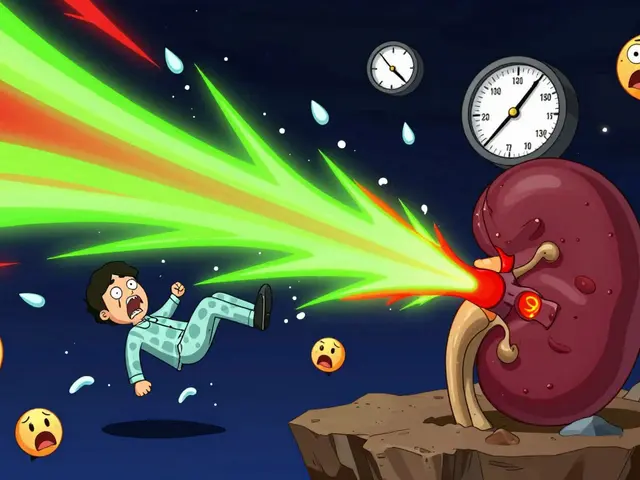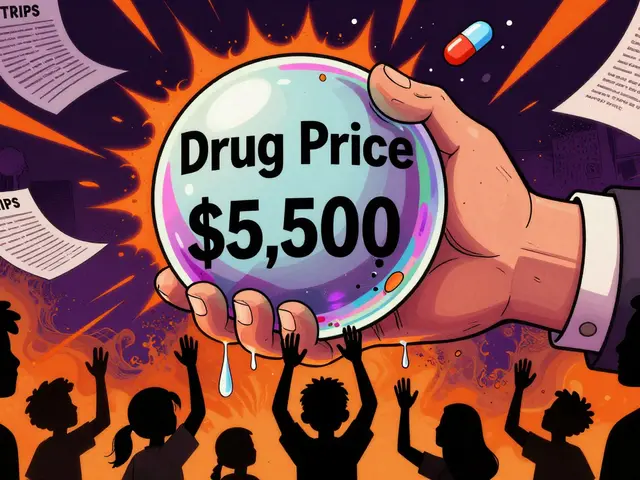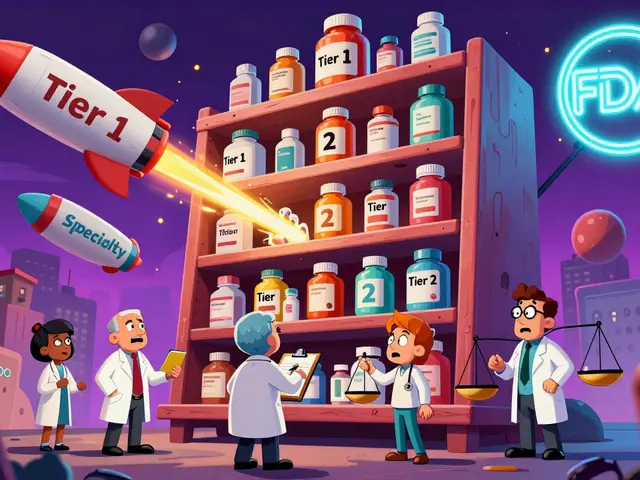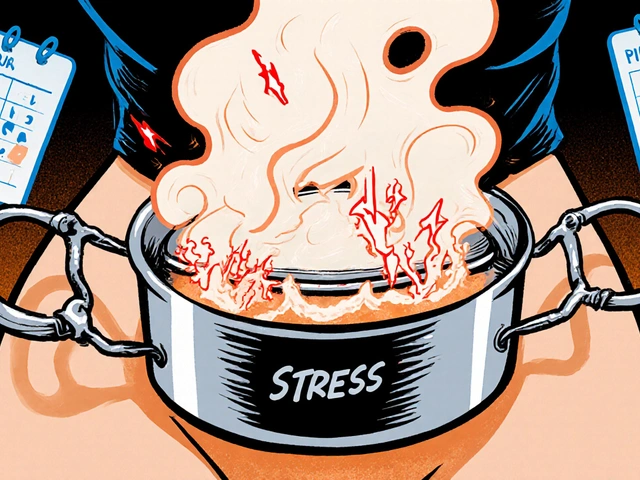If you walk into a pharmacy looking for an antidepressant, you’ll probably hear the name Bupron SR mentioned at some point. This small, oblong tablet has quite a story. Over 30 million prescriptions for its main ingredient, bupropion, are written every year worldwide. Why does this pill get so much attention? Because it’s not your typical antidepressant and people on the internet genuinely want to know if it’s going to help or mess things up.
What Is Bupron SR and How Does It Work?
Bupron SR is a brand name for bupropion sustained-release. It’s mainly prescribed for depression, but also helps people quit smoking. It stands out from other antidepressants because it doesn’t make you drowsy or affect your sex drive as much as many older treatments. Instead of working on serotonin—like most antidepressants—Bupron SR targets norepinephrine and dopamine, which are brain chemicals responsible for motivation and enjoyment. If those sound familiar, you’re right: they have a lot to do with how you get out of bed when you don’t feel like it, or find the energy to call a friend back.
The ‘SR’ just means sustained-release, so one dose keeps working throughout the day. For people struggling with energy or focus, that steady support can make a big difference. Fun fact: Bupropion is one of the very few antidepressants repeatedly shown to help with symptoms like fatigue and decreased focus, especially in people who don’t respond to other medications.
Doctors often prescribe Bupron SR in doses of 150 mg taken once or twice daily, but sometimes start low and increase it gradually to minimize side effects. Because it’s available in sustained-release form, people don’t have to take it as often—a major plus for those of us who tend to forget midday medications.
| Bupron SR Key Facts | Details |
|---|---|
| Main ingredient | Bupropion hydrochloride |
| Dose forms | 150 mg, 300 mg (SR) |
| First approved | 1985 (as Wellbutrin in the U.S.) |
| Used for | Depression, smoking cessation, ADHD (off-label) |
| Common side effects | Insomnia, dry mouth, headache |
Benefits People Actually Notice
So, why do some people swear by Bupron SR? The real wins usually come down to energy and mood. Unlike many old-school antidepressants that leave folks yawning in meetings or gaining weight out of nowhere, Bupron can give you an energy boost instead of a “chill out” effect. That’s especially true for folks whose depression feels more like slowness, brain fog, or trouble focusing instead of just sadness.
Another big benefit—Bupron SR doesn’t have as much negative impact on sex drive compared to other options. You won’t see this on a prescription label, but it’s the kind of thing real people talk about when they share stories online or in support groups. Fewer sexual side effects can be a deal-breaker in whether someone sticks with their meds or skips their next refill.
If you’re trying to quit smoking, there’s even more to talk about. A pile of studies show that bupropion increases the odds of quitting cigarettes by almost two times compared to a placebo. For those battling both depression and nicotine cravings, Bupron SR is one of the only drugs that can tackle both problems at once.
Some doctors even prescribe Bupron SR off-label for things like adult ADHD. Clinical data is mixed, but for people who can’t tolerate stimulants, bupropion can sometimes help with attention and impulse control. Just don’t expect miracles—the effects are usually mild compared to dedicated ADHD medications.
On the numbers side of things, people taking bupropion report rates of weight gain and sexual dysfunction around half as often as those taking SSRIs like sertraline (the classic Zoloft). Many find these differences life-changing when managing long-haul mood disorders.

Risks and Side Effects You Need to Know
No drug is perfect, and Bupron SR has its quirks. The first thing you’ll hear is that it can cause insomnia—about one in three people notice it. If you already have trouble sleeping, taking the last dose before 5 pm helps most users. Dry mouth and headaches are also common, but usually fade after a few days or weeks.
The serious risks are rare, but hard to ignore. The biggest one is seizures. Bupropion raises the risk of seizures more than most antidepressants, though the risk is still well under 1% unless you have risk factors (history of seizures, eating disorder, or you drink heavily). Doctors usually start at low doses and keep an eye out for warning signs. If you have a seizure condition or struggle with anorexia or bulimia, Bupron SR usually isn’t the best choice.
Bupron SR also interacts with a bunch of other common meds. For example: If you’re on antipsychotics, some ADHD meds, or a bunch of over-the-counter allergy stuff, your doctor will want to check for interactions. Grapefruit juice is okay—but mixing bupropion with other antidepressants without talking to your doctor? Not a great plan.
Mood swings sometimes happen in the first two weeks, and a tiny fraction of people notice increased anxiety. These are both reasons to keep close tabs with your care team—especially if you’ve had bipolar disorder in the past, since bupropion (like all antidepressants) can sometimes nudge people into mania.
Here’s something a lot of people ask: What happens if you miss a dose? The answer: Just skip it. Don’t double up. Taking more than prescribed increases side effect risks, including the not-so-fun ones like seizures.
Below, check out the breakdown of the most common side effects from one published clinical review:
| Side Effect | Approx. Frequency |
|---|---|
| Insomnia | 30% |
| Dry mouth | 20% |
| Headache | 15% |
| Weight gain | <5% |
| Sexual dysfunction | 2-5% |
| Seizure | 0.1-0.4% |
Smart Tips for Using Bupron SR
If Bupron SR is on your script, planning ahead can save you a lot of headaches—sometimes literally. Here are some useful tips, straight from real users and prescribers:
- Take it early: Swapping the second dose to mid-afternoon instead of at night cuts down insomnia for most people.
- Watch for dehydration: Bupron SR can dry you out, so always have a water bottle nearby.
- Don’t mess with your dose: Skipping or doubling up raises side effect risks. If you forget a tablet, just move on to your usual schedule.
- Track the ups and downs: Jotting down your mood, sleep, and appetite during the first two weeks helps catch patterns and spot issues quickly.
- Ask your doctor before mixing anything: Even common cold meds, alcohol, or supplements can interact in weird ways. Play it safe and double-check first.
- Be patient: Results with Bupron SR aren’t instant. Most people need two weeks or more to see real changes in mood or energy.
- Check your blood pressure: For some folks, Bupron SR can bump up blood pressure, especially at higher doses.
A cool but little-known benefit: People who find SSRIs make them sleepy or groggy often find bupropion works the opposite way. If your depression feels like walking through molasses, this might be a nudge in the right direction.
On the flipside, Bupron SR isn’t the best choice if you’re already wound tight or wired—too much dopamine and norepinephrine can spark anxiety. Always check in if your symptoms shift in a way you didn’t expect.
If you’re taking Bupron SR for quitting smoking, the key is sticking to your dose even after the cravings start to fade. The risk of slipping back into old habits is highest in the first 4-8 weeks. Real-life quitters say pairing the medication with support groups and a distraction plan (chewing gum, walks, or games) gives quitting power a boost.
Always stash your medication out of reach for kids and pets—it’s not safe for little ones, and the risk of overdose in animals is higher than people think.
Talking to a real human prescriber about switching to or from Bupron SR? Most recommend easing on or off if you can, though withdrawal symptoms are pretty rare with this drug. If you notice new headaches, muscle pain, or sudden mood dips when stopping, flag it with your doctor.
At the end of the day, Bupron SR is a solid and often underestimated player in the world of depression and smoking cessation treatment. It’s especially worth considering if you just can’t handle sleepy side effects or don’t want your medication to impact your sex life. Stick to the plan, check in regularly, and don’t be shy about sharing any weird symptoms along the way. This medication isn’t magical, but for the right person, it can make a regular old Tuesday morning feel possible again.







Comments
NORMAND TRUDEL-HACHÉ
August 13, 2025 AT 20:16 PMInteresting summary — clean and practical.
I like that the post calls out motivation and energy as the main wins for Bupron SR, because that's what makes it stand out in real life, not just in textbooks. The sustained-release angle is also underrated; fewer midday pills means fewer missed doses, which actually matters. A small caveat: people with insomnia issues should be warned clearly about timing the second dose earlier. Also, the bit about sexual side effects being lower is accurate enough to be a deciding factor for some patients who hate SSRIs. Overall a useful primer for anyone who wants a quick sense of whether bupropion could fit their profile.
sourabh kumar
August 13, 2025 AT 21:16 PMGood write up one question though does it make anxiety worse sometimes
Garreth Collard
August 14, 2025 AT 01:03 AMWow, this hit hard for me — thanks for writing it out so plainly.
I was on an SSRI for years and it flattened everything until a friend suggested trying bupropion when my mornings felt like trudging through mud. The first week I noticed tiny lifts — more able to answer texts, less stuck on the couch. By week three I could actually plan to leave the house without the internal argument that used to win every time. That feeling of having a little more friction in the engine is profound; it's not fireworks but it is getting the day to start moving.
But it's not all roses. I learned the hard way about timing the dose — insomnia crept in when I took the second pill too late, and for me dry mouth was annoying for a couple weeks. I also got panic-like spikes twice in the early days and had to call my doc. We adjusted timing and dose and the spikes settled, but it was a wake-up call to take side effects seriously. The seizure risk feels scary if you just read the headline, but my prescriber explained context and screened me for red flags before starting, which helped me relax into it.
For anyone quitting smoking while depressed, this drug felt like a two-for-one lifeline — cravings dulled and mood was steadier. That said, pairing it with therapy and a quit plan made the difference. If you're thinking of starting, please track sleep and mood closely, have a plan for early anxiety, and tell whoever prescribes about any eating disorder or heavy drinking history. It changed my average Tuesday from impossible to manageable, and that's not nothing.
Gary Levy
August 14, 2025 AT 21:33 PMNice breakdown in the OP — balanced and useful.
Two practical notes from my experience as someone who helps friends through med changes: 1) ask about blood pressure checks if you or your family have hypertension, and 2) keep a simple symptom log for two weeks — just mood, sleep, appetite. Those little data points make follow-up appointments way more productive. Also be honest about alcohol use; bupropion plus heavy drinking raises the seizure risk and that's not something to gamble with.
Christian Miller
August 16, 2025 AT 01:20 AMOne must always consider who benefits financially from popularizing 'safer' meds.
Pharmaceutical interests have a long history of positioning alternatives as superior with carefully spun language. That said, bupropion's distinct pharmacology (norepinephrine/dopamine emphasis) is real and explains differing side effect profiles. My concern is less about the molecule and more about systemic incentives to prescribe adjustments rapidly without adequate baseline screening. If you are prescribed Bupron SR, insist on a complete review of your other meds and substance use history. And demand objective monitoring where possible.
Julius Adebowale
August 17, 2025 AT 05:06 AMShort version: works for some, not for others.
Don't mix with weird supplements.
KISHORE KANKIPATI
August 18, 2025 AT 08:53 AMReally appreciate the lived experience shared earlier.
For anyone nervous about starting Bupron SR, a gentle approach helps — start low, go slow, and keep a little notebook or app to jot down how you're sleeping, whether your appetite changes, and any jittery feelings. It's surprising how many small patterns you catch in two weeks that guide a smart tweak instead of panic.
Also, if quitting smoking is part of the plan, lining up a support buddy or a weekly check-in helps more than you'd think. Medication is powerful, but so is the scaffolding around it — counseling, routines, and even simple distraction strategies when cravings hit.
Jefferson Vine
August 19, 2025 AT 12:40 PMI don't fully trust the 'two birds with one stone' line when it comes to meds and smoking cessation.
Too neat, too tidy. They make it sound like Big Pharma handed us a miracle that happens to reduce cravings and depression simultaneously while the fine print collects in the background. My worry is cross-interactions and underreported rare effects that only show up after millions of prescriptions — the sort of statistical ghosts that regulators eventually notice decades later. Still, the evidence for bupropion helping quit smoking is solid; I just keep wondering if we're missing long-tail harms because everyone moves on too fast.
So yeah, it's useful, but keep your radar on and don't assume 'approved' means problem-free forever.
Donna Oberg
August 20, 2025 AT 16:26 PMThank you for this thread!!!
This is SO important to discuss openly — people deserve to know both the wins AND the risks.
I’ve been on bupropion and it helped me in ways SSRIs never did!! Insomnia was rough for a few nights but manageable with timing adjustments!! I also really recommend writing down moods daily because it helps so much at appointments!!!
Daniel LaMontagne
August 21, 2025 AT 20:13 PMI want to echo the practical tips and add a tiny checklist that helped a friend 😊
1) Take the second dose by late afternoon
2) Keep water near you (dry mouth is annoying)
3) No doubling up if you miss a dose
4) Tell your doc about alcohol and seizure history
Small steps. Big impact 🙂
Garreth Collard
August 23, 2025 AT 00:00 AMReplying to that checklist — yes, the simple checklist is everything.
When I first started, I almost ignored the 'no doubling up' rule and that could've been a disaster. A missed dose, whatever — but stacking doses because you felt "off" amplifies side effects fast. Also, for anyone curious, combining bupropion with therapy was a game-changer; meds steadied the baseline, therapy taught coping habits so gains weren't fragile. It's boring and slow but it works.
Julius Adebowale
August 24, 2025 AT 03:46 AMOne more quick thing — if you have an eating disorder history tell your doctor. It's not worth the risk.
Gary Levy
August 29, 2025 AT 22:40 PMThanks for the emoji checklist — that's exactly the kind of friendly, shareable info people need.
Also, if sleep is a big issue, try a hard cutoff for screens an hour before bed along with moving the dose earlier. It won't fix everything but it reduces the chance insomnia spirals into anxiety about sleep, which then makes insomnia worse. Small behavioral nudges plus the med often do better than either alone.
sourabh kumar
September 4, 2025 AT 17:33 PMnoted thanks
Jefferson Vine
September 12, 2025 AT 17:13 PMFinal thought before I sign off — vigilance matters.
I don't mean fear-mongering. I mean practical observation: track changes, get follow-ups, report odd symptoms early, and keep a transparent line with your prescriber. The drug is useful, often underappreciated, and can be life-changing. But no medication exists in a vacuum — people, habits, and systems interact with it. Treat it like a tool, not a talisman. That way you get the benefit and reduce the chance of surprises.
Also, for the record, always check interactions with over-the-counter meds and herbal supplements. Those 'natural' remedies are not always neutral partners.